
presents:
SIX STORIES FROM MOZAMBIQUE
© 1998 RADIO BRIDGE OVERSEAS TRUST

Beira, Mozambique's
second largest city
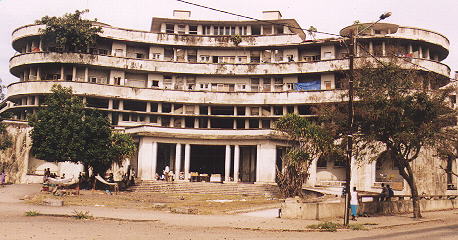
The smell of
excrements, covering the set up of this rotting city at the
seaside like an invisible blanket, has guided us along the
bizarre ruin of the Grand-Hotel, refuge for hundreds of families
who live in burnt-out rooms and on broken balconies where bushes
and trees found enough fertile ground.
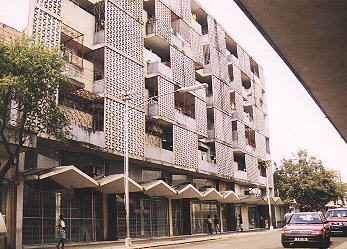
A multi-storey-building in the city centre, nothing indicates
that 2 floors are occupied by studios and offices of a radio
station.
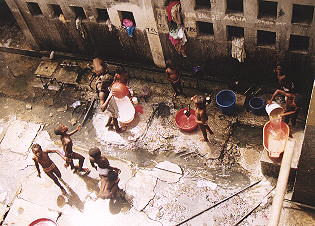 No electrical light assists in the
staircase,
No electrical light assists in the
staircase,
the hand-railings give way.
Shouting from playing
children in the back yard.
Jose Albano Manuel is Radio Mozambique’s representative in
Beira,
he manages the local studio.
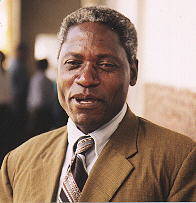
He works with
Radio Mozambique since 1975. That was the year when the marxist-leninist
FRELIMO took power from the Portuguese, and with it the power
over the radio system. Propaganda has been not unfamiliar to him.
In 1963, he started at Radio Pax of the catholic church, the
voice of the Vatican. The building here has been used by the
Portuguese to indoctrinate radio listeners in the rural areas in
their native languages. The fact that the whole city of Beira,
including these radio-studios, have been developed a state of
decay has something to do with the point of view as seen from
Maputo, the capital in the South. Beira, and the whole north of
Mozambique, are still being seen as stronghold of RENAMO, the
former terrorist movement, now a political party in opposition to
the government. All efforts of Austrian experts to develop radio
into an instrument of teaching potential voters to participate in
democratic elections have been in vain in this particular
environment: RENAMO boycotted the first communal elections in May
1998. No chance to practice what radio taught.
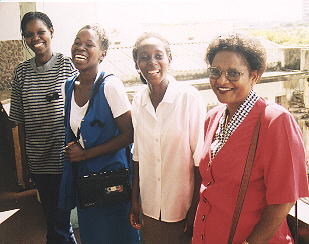
Lucia Rodriguez (right)
is head of a radio project in Beira which tries to achieve 2
objectives: to provide a forum for woman on radio, and to make
radio programs accessible in indigenous languages. Portuguese,
the official language, has never played a major role for people
in the rural areas of Mozambique.
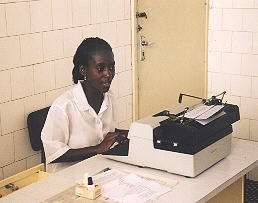
Christina Maria
Patricio is 26, her colleagues at the other 2 desks in a former
kitchen are of the same age. All 3 had no experience whatsoever
in journalism. They were trained in courses organised by the
Austrian North-South-Institute for Development Cooperation.
And how do they now identify their topics?
"We get to know what is happening through many
organisations which deal with women issues, with health, with
nursing of children."
Lucia Rodriguez and her partner from Austria are coordinating the
topics for all 30 woman-reporters in all provinces. Once a month
these young women have the possibility to travel for 5 days to
the rural areas themselves, looking for women who want to
participate in the discussion.
Name of project:
"Radio Mozambique / Voice of Women"
Supported by: Austrian North-South-Institute for Development
Cooperation, Vienna
Local partner: Radio Mozambique, Beira
Lucia Rodriguez
 Listen / STORY 2 - / 07'56"
Listen / STORY 2 - / 07'56"
"How radio serves democracy - Broadcasting in Beira"
Christina’s colleague,
Musha Gomez, has already received notice by Radio Mozambique to
be employed. Every year, 10 journalists, trained and paid by the
Austrian project, join the staff of the state-owned radio station.
But they are living in an urban environment, what do they know
about women in rural areas? "That is how we cope: We
live in town, however we move out, because we know, it never
happened that something from there has been on radio. And,
because we use the same language, these women feel free to talk
to us."

TOP OF THIS PAGE

MORE MOZAMBIQUE STORIES
THE RBO PRODUCTION
TEAM:
Research & Interviews in Mozambique:
Victor Desajado, Emmanuel
Camillo, Fortune Ncube, Klaus Juergen Schmidt
Scripts:
Victor Desajado,
Fortune Ncube, Klaus Juergen Schmidt
RBO-Interns attached
to research at Cahora Bassa:
Holger Bock, Olaf
Krems, Morris Nyakudya
Presenter:
Victor Desajado,
Fortune Ncube, Dadirayi Chigoya, Shorai Kariwa
Translation in
Mozambique:
Victor Desajado,
Emmanuel Camillo, Lucia Rodriguez, Christina Maria Patricio
Technical Supervision
at RBO studio:
Norbert Irmer &
Nenad Kuzmic
Administration &
Logistics:
Jennifer Chiriga
& Dadiray Chigoya
Managing Editor &
Director:
Klaus Juergen
Schmidt




No electrical light assists in the
staircase,
Listen / STORY 2 - / 07'56"
![]()
![]()